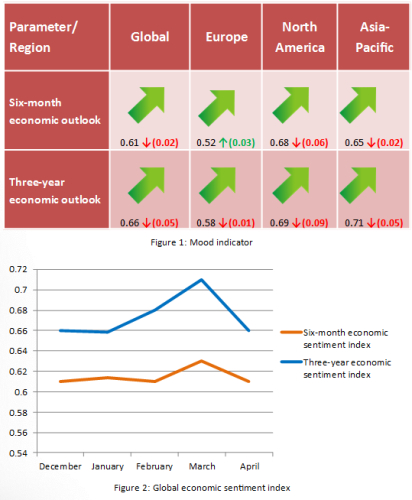Full report available here

- All but one region faced a decline of professors’ sentiment in April due to intense headwinds blowing in every part of the world. Yet, Europe appeared to be a bright spot, as its short-term economic outlook improved in the reported month, despite political and economic turmoil on the continent and British Isles. The North America was the biggest downside contributor to the global economic outlook, as the region saw the biggest deterioration in economic forecasts, as both six-month and three-year economic sentiment indexes fell dramatically.
- While in the UK growth has been supported by the services and manufacturing sectors, as well as robust consumer spending, in the Euro zone there were signs that a recently launched QE programme supported the Euro area’s economic recovery. Yet, political uncertainty continues to weigh on region’s leaders. Hence, short-term economic sentiment inched up last month, albeit to a limited extent. Long-term outlook, however, slightly worsened, according to academia experts’ view.
- The recent data from the world’s number one economy questions a possibility of the monetary policy normalization, which is considered to be a sign of sturdy economic performance. Meanwhile, in Canada the negative impact of lower oil prices on the nation’s economy has yet to fade away, while the January rate cut has begun to help put the nation’s economy back on track. The uneven economic performance of the region forced to trim professors’ economic projections both for the upcoming six-month period and for the next three years.
- In the Asia-Pacific region worries are mounting over the Chinese economy, which saw the slowest quarterly growth pace in six years. In Japan, the world’s third biggest economy, officials delayed the timing of hitting the price target. Consequently, professors’ economic sentiment deteriorated in April compared to the previous month.


